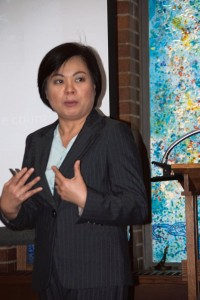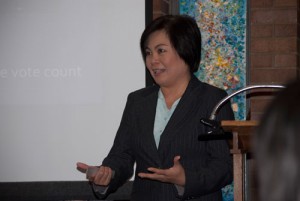New media and citizen journalists
New media and citizen journalists
By Beatrice Paez
TORONTO – Lynda Jumilla may label herself as an old school journalist but this veteran broadcaster is still open to learning the new tricks of the trade.
Twenty-five years since her career took off, which included a crossover from print to broadcast journalism, Jumilla is still strutting her skills in the political beat, covering elections, political parties and the major institutions of government.
This focus enabled her to hone in on the trends that have paralyzed and propelled change in electoral politics, allowing her to lend insight into the role media can play in shaping the culture of politics and earning her accolades from her peers.
But while she has stuck to her roots, Jumilla has been developing her flair for new media. With election fever in the air, she views new media technologies as a critical tool in engaging the public and in steering the dialogue back to the issues of the moment.
This year Jumilla is breaking new ground, as the first broadcast journalist to be chosen as the Marshall McLuhan fellow for her dedication to the craft and ability to deliver compelling, in-depth accounts of issues.
The fellow is handpicked by a committee of senior journalists based on the Center for Media Freedom and Responsibility’s (CMFR) survey of coverage. As the recipient of the award, she has the opportunity to travel to Canadian cities, to lecture and exchange notes with Canadian media experts, academics and students.
On the home front, she has been anchoring ANC’s Road to 2013, a political program documenting the impact living electoral practices will have on the upcoming midterm elections in May.
Lecturing before her kababyans and other Canadians at the University of Toronto, Jumilla shared with them the evolving, and sometimes stagnant portrait of Philippine electoral politics and the lessons learned in how journalists can help draw out a more dynamic representation of electoral concerns.
Tensions during the election cycle have been relieved, Jumilla notes, since the move from manual to the automated tallying of votes in 2010, reducing the ability of politicians to tamper with votes.
While new technology can help force a change in behaviour, alterations to other parts of the political machinery require the media and the public working hand in hand to hold politicians accountable.
For Jumilla, working with citizen journalists is key to engaging with viewers in politics. “Some people think it’s a competing medium, but in our case we have decided to partner with citizen journalists,” she says. “We give them a forum to air their issues, rather than just let them do it on their own, we would be able to control the issues in terms of verification and investigation.”
People can help set the news agenda, calling attention to incidents and concerns that are having a profound impact on their lives, she adds. They are invited to submit photos and videos to help tell their story.
She cites the Anti-EPAL movement, where people challenged the self-congratulatory, self-promotion posters of politicians that claim credit for public works projects, as an initiative that originated with the public and is seeking to change the personality- driven culture of politics.
The movement, she notes shamed some politicians into taking down their streamers.
Featuring stories like this and unpacking the issues that surround it, is where journalists come in, says Jumilla.
Using new technology has also helped bring the stories to life, particularly when it comes to reporting on statistics. To help stimulate public interest, her program uses augmented reality to animate data and give people a visual representation of the race.
As self-professed watchdogs for civil society, journalists have taken on countless roles during the elections, including helping count votes, she says, but their commitment to holding politicians accountable remains constant.
Her show has been bringing attention to the plight of senior citizens, people with disabilities and overseas Filipino workers who may be effectively disenfranchised without proper and reasonable access to the polling stations. Reporting these issues months ahead of the election, she hopes it will help mobilize the government into expanding accessibility.
While some headway has been made on this front, with a nationwide campaign to get seniors and PWDs to cast their ballots, there are other worrisome developments that could delete any progress that has been made in securing free speech.
The Cybercrime Law that was suspended for 120 days until further deliberation on whether it violates civil liberties has had a “chilling effect on netizens,” says Jumilla. But the outcome has not yet been written, she says many are not ready to go without a proper fight and are still vocalizing their opposition.
In her 25 years as a political journalist, Jumilla has seen it all — “I have seen the entire process evolve, or go backwards.”


Comments (0)